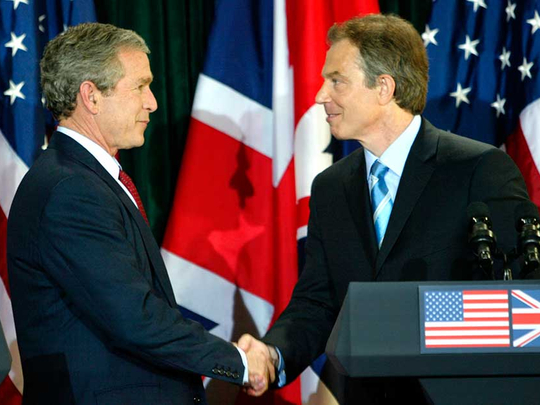
When western powers, led by the then United States president, George W. Bush, had opted to save Iraqis by destroying their country, few imagined that the concocted liberation from a tyrant allegedly holding weapons of mass destruction (WMDs) would be little more than a “cakewalk”.
Bush embarked on an adventure that cost many lives and resolved nothing. His acolytes, including the then British prime minister Tony Blair — who presumably added British gravitas to his American ally’s cowboy mindset — jumped on the mistaken bandwagon, which produced devastating results. Iraqis and many others now live through gargantuan errors committed by Bush, Blair, former Iraqi prime minister Nouri Al Maliki and many others, and one has to be a real optimist to see light at the end of what is turning out to be a very, very, long tunnel.
Yet, there is optimism, for justice may finally be served albeit in the country that gave humanity the Magna Carta. Although long overdue for internal political reasons, the Iraq Inquiry, which is also known as the Chilcot Inquiry (named after its chairman Sir John Chilcot), was finally due to be published on July 6, even if the draft document was completed in 2012.
Various leaks and hints gathered from a number of interviews by commission members confirmed that unprecedented levels of carelessness occurred in the decision-making process. That’s spot on. Furthermore, many mistakenly believed that former Iraqi president Saddam Hussain would capitulate and that his forces would quickly submit to a new order. In so far as the invasion and occupation turned out to be bloody affairs, with still unfolding consequences, what we already knew, but can finally say without any evasion, is that Bush, Blair and the others had lied.
Simply stated, there were no WMDs and while this was highlighted by the then British foreign secretary Robin Cook — whose memorable resignation speech in the House of Commons on March 17, 2003, explained: “Iraq probably has no weapons of mass destruction” — what was unbecoming was Blair’s smugness, as he pretended to know, to use former US secretary of defence Donald Rumsfeld’s confused but oh-so-brilliant prose — “unknowns”.
As an Oxford graduate, Blair could not match Rumsfeld’s Princetonian language — “as we know, there are known knowns; there are things we know we know. We also know there are known unknowns; that is to say we know there are some things we do not know. But there are also unknown unknowns — the ones we don’t know we don’t know” — that will go down in history as a shining addition to English literature.
The greatest unknowns, beyond non-existent WMDs, were false assumptions that Iraqis were weak, incapable of resistance and, perhaps worse than any other consideration, that western governments could get away with pre-emptive attacks against small countries that aspired to join greater ones.
With the Chilcot Report, we can now confirm how the British and American governments deceived themselves and others, which is a significant step forward. In fact, and notwithstanding watered-down language that such documents contain, Chilcot highlighted the end of illusions by those who still attach importance to what major powers do, or what slick leaders like Blair and Bush, say. The measured account might even encourage senior Labour Party, and those in the Scottish National Party who might find the courage to take on wounded Brexiters, to call for legal action against Blair. There is even talk of impeachment under an ancient law, which was last used in 1806 to try Tory minister Lord Melville for misappropriating official funds, although that will probably not occur.
Still, the mere fact that Blair might face a trial and receive a sentence, will serve justice. A successful businessman who has racked hundreds of millions of pounds from questionable deals, Blair may or may not worry that so many no longer hold him in the highest regard. Even his Middle East Quartet position, which he held until May 2015 and that could have turned his reputation around had he managed to advance peace-process markers by a single inch, was a flop that did not seem to bother him much.
In that respect, Blair seems happy to emulate George W. Bush, who has become a painter and who still hopes that history will be kind to him. “I’m just not going to be around to see the final verdict,” the two-term president told CNN in a wide-ranging interview in April 2013, concluding with what will also go down as his contribution to literature: “In other words, I’ll be dead,” which illustrated his haughtiness.
Of course, all of us are temporarily on earth, though those who yield power over others have the duty not to be conceited. As Iraq faces grave challenges against extremists, Western powers must not forego their obligations, yes obligations, to assist a country they wrecked. Bush and Blair in particular must be held accountable for their decisions. Chilcot is step one and one hopes that Britain will quickly rise to restore its greatness by taking Blair to the woodshed.
Dr Joseph A. Kechichian is the author of the just-published From Alliance to Union: Challenges Facing Gulf Cooperation Council States in the Twenty-First Century (Sussex: 2016).









